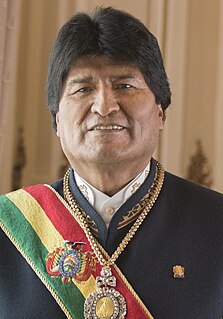
The politics of Bolivia takes place in a framework of a presidential representative democratic republic, whereby the president is head of state, head of government and head of a diverse multi-party system. Executive power is exercised by the government. Legislative power is vested in both the government and the two chambers of parliament. Both the Judiciary and the electoral branch are independent of the executive and the legislature. After the 2014 election, 53.1% of the seats in national parliament were held by women, a higher proportion of women than that of the population.

Council of Ministers of Bolivia, or Cabinet of Bolivia, is part of the executive branch of the Bolivian government, consisting of the heads of the variable number of government ministries. The Council of Ministers are ministers of state and conduct the day-to-day business of public administration within Bolivia. The President of Bolivia may freely reorganize the executive branch, with the most recent comprehensive reorganization occurring in February 2009. Since then, the Ministry for the Legal Defense of the State has become the independent office of Solicitor General, and the Ministry of Communication has been created.
Hernán Siles Zuazo was inaugurated on 10 October 1982 and formed his cabinet.
The High Command of the Military of Bolivia entrusted General Guido Vildoso Calderón with the Presidency on 21 July 1982, and he formed his cabinet.
The High Command of the Military of Bolivia entrusted General Celso Torrelio Villa with the Presidency on 4 September 1981, and on 7 September 1981 he formed his cabinet.
The Junta of Commanders of the Armed Forces ruled Bolivia from 4 August 1981 through 4 September 1981. On 11 August 1981 the Junta formed a new cabinet.
The High Command of the Military of Bolivia entrusted General Luis García Meza Tejada with the Presidency on 18 July 1980, and he formed his cabinet.
Lidia Gueiler Tejada was inaugurated on 16 November 1979 as Provisional President of Bolivia and formed her cabinet on 19 November 1979.
In Bolivia on 1 November 1979, Colonel Alberto Natusch Busch executed a coup d'état against the constitutional government of Wálter Guevara Arze, and formed his cabinet.
Wálter Guevara Arze was inaugurated on 8 August 1979 as Provisional President of Bolivia and formed his cabinet on 9 August 1979.
General Juan Pereda Asbún assumed the presidency of Bolivia on 21 July 1978, and on 24 July 1978 formed his cabinet. He was removed from office on 3 November later that year.
General Hugo Banzer Suárez had taken the Presidency 21 August 1971, and formed his cabinet.
General Juan José Torres had taken the Presidency 7 October 1970, and formed his cabinet.

The Arce Cabinet constitutes the 222nd cabinet of the Plurinational State of Bolivia. It was formed on 9 November 2020, one day after Luis Arce was sworn in as the 67th president of Bolivia following the 2020 general election, succeeding the Áñez Cabinet. The cabinet is composed entirely of members of the ruling Movement for Socialism. Described as a "technocratic" cabinet, it has been noted for the low-profile and youth of some of its members as well as its political distance from former president Evo Morales.

Enrique Hertzog assumed office as the 42nd president of Bolivia on 10 March 1947, and his term ended upon his resignation on 22 October 1949. A physician who served in various ministerial positions since the 1920s, Hertzog was elected as the head of the Republican Socialist Unity Party (PURS) ticket in the 1947 general elections.

The Ministry of the Presidency is the department of the Government of Bolivia that provides support to the presidential administration by coordinating its political-administrative actions with the different ministries as well as the legislative, judicial, and electoral branches of government in addition to social sectors and cooperatives. Aside from these tasks, the ministry acts as the chief custodian of the government, filing all laws, decrees, and resolutions and publishing them in the Official Gazette of Bolivia.
The Ministry of Government is a ministry of the Plurinational States of Bolivia. It is tasked with regulating public policy. The current Minister of Government is Eduardo del Castillo since 9 November 2020.

The cabinet of Jeanine Áñez constituted the 220th and 221st cabinets of the Plurinational State of Bolivia. It was initially formed on 13 November 2019, a day after Jeanine Áñez was sworn-in as the 66th president of Bolivia following the 2019 political crisis, in which the ruling Movement for Socialism government resigned. A second cabinet was formed on 28 January 2020 with all but three ministers being ratified in their positions.

The Cabinet of Evo Morales constituted the 210th to 220th cabinets of the Plurinational State of Bolivia. It was initially formed on 23 January 2006, a day after Evo Morales was sworn-in as the 65th president of Bolivia.

The Achá Cabinet constituted the 26th to 29th cabinets of the Bolivian Republic. It was formed on 17 May 1861, 13 days after José María de Achá was sworn-in as the 14th president of Bolivia following his election by the Constituent National Assembly, succeeding the Government Junta. It was dissolved on 28 December 1864 upon Achá's overthrow in a coup d'état and was succeeded by the Cabinet of Mariano Melgarejo.